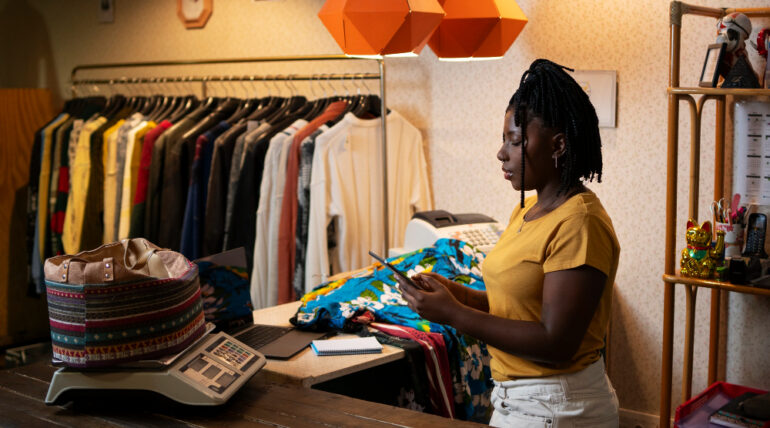 August 8, 2025
August 8, 2025
Here’s something for you: that your neighbor who started selling on Instagram last month will likely not be by Christmas.
Walk down any Nigerian street today and you’ll hear a familiar story: someone’s cousin launched an online store, made a few sales, then disappeared just like the thousands of others before.
But that’s the reality. Nine out of ten Nigerian e-commerce ventures fail within their first year, and it’s not because they lack hustle or great products.
You see, while everyone’s rushing to join the next big business online, most are only walking into the same predictable traps.
They’re dealing with customers who won’t pay until they see the goods, courier services that treat packages like football practice, and power outages that kill their momentum just when orders start flowing.
Add the nightmare of getting reliable internet in some areas and payment gateways that cost more than some people’s monthly salary, and you’ve got a recipe for business disaster.
But there’s one thing that separates the 10% who thrive from the 90% who crash and burn: the former group understands that online business in Nigeria is a different beast entirely, with its own rules, challenges, and surprising opportunities.
You aren’t just moving an offline business online here, and if you want to be successful, you and your brand need to start solving problems most entrepreneurs don’t even realize exist.
This article exposes the insider strategies to join the elite few who survive and profit from the Nigerian e-commerce space.

Challenges to Nigerian E-commerce (And How You Can Escape)
Here’s where we get real about what you’re up against in Nigeria as an online store owner.
The Delivery Drama
Let’s say you finally got that big order. You took the time to package it perfectly, hand it to a courier, and then… crickets.
Your customer is calling you angry because their package took so long to travel from Lagos to Abuja, or worse, it’s sitting in some unknown location while the tracking system shows “out for delivery” for the fifth day straight.
What to Do
To avoid delivery stories that touch, don’t put all your eggs in one courier basket. Nigeria’s poor road networks and high delivery costs mandates that you have backup plans for your backup plans.
Partner with at least three different logistics companies. We recommend that you mix the big names with reliable local ones. Always give customers realistic delivery windows (add extra days, trust us), and consider offering pickup points in major areas. Your customers will appreciate honesty over false promises.
The Payment Trust Battle
Nigerians still don’t trust online payments due to previous bad experiences. The average customer will pick cash on delivery eight times out of ten even in this big 2025.
But who could blame them?
Your customers are wired to want to see, touch, and inspect their goods before parting with their hard-earned naira. This creates a cash flow nightmare for you and turns every delivery into a potential drama.
What to Do
Let the cash-on-delivery reality work for you. Set up your cash management and security measures properly. Consider requiring pre-order fees (as low as ₦1,000) to filter out non-serious buyers.
Be thoroughly transparent about return policies and sharing customer testimonials so as to build trust. The goal is to earn trust that makes customers comfortable paying upfront eventually.
The Power Play Problem
Nothing kills your momentum like spending hours optimizing your online store, only to have the electricity distribution company cut your power right when orders are flowing in.
As with most other things in the country at the moment, inconsistent electricity supply remains a significant barrier to e-commerce development in Nigeria. Your phone dies, your internet goes off, and customers have to wait till you reappear.
What to do
Invest in a decent power bank and mobile internet backup your phone and a small wifi device as well. Schedule your most critical business activities (responding to messages, processing orders) during times when power is most reliable in your area.
Use cloud-based chat apps (like Whatsapp, Whatsapp Web and Telegram) that sync across devices, so you can switch from laptop to phone seamlessly when needed.
The Infrastructure Reality
If the sporadic electricity is making online businesses hard, bad road networks only pile on the difficulty. Product delivery is extremely tricky, while lack of warehouse space means your inventory management is on an O.Y.O (On Your Own) level.
On top of competing with other businesses, you’re up against roads that can damage goods and logistics systems that aren’t anywhere close to e-commerce speed.
What to Do
Start hyperlocal and expand gradually. Instead of trying to serve all of Nigeria (or even a whole state) from day one, master your immediate area first. Know which roads your couriers should avoid, which areas have the most reliable delivery success, and build relationships with local pickup points.
This might seem limiting at first, but you’ll agree with us that establishing profit dominance locally beats even a single nationwide loss.

Helpful Tips to Starting an Online Business in Nigeria
Let’s discuss some battle-tested strategies you must consider if you want your ecommerce business in Nigeria to work for you:
Pick Your E-Commerce Platform Wisely
Shopify is widely recognized as the best ecommerce platform for beginners, offering an all-in-one package that includes tools for selling online, in-person, and via social media.
Yes, it costs money (around $29/month), but think of it as insurance against technical headaches. You want to spend your time selling products, not fixing website bugs at 2 AM.
If your budget is tight, WooCommerce is completely free to use and allows you to take e-commerce transactions on WordPress. Just know you’ll need to handle more technical stuff yourself.
We have an ecommerce platform guide if you’d like to get into more details. Once you’re making consistent money, you can always switch if needed.
Optimize for Nigerian Shopping Behavior
Nigerian customers shop differently, no matter what e-commerce guides tell you. They want to see multiple product photos from every angle. They’ll WhatsApp you twenty questions before buying a ₦5,000 item; screenshot your product and send it to three friends for opinions.
Work with this, not against it. Include detailed product descriptions that answer obvious questions. Don’t forget to add your WhatsApp number prominently. Create size guides with Nigerian measurements (not just “Medium” and “Large”). Also, make your return policy crystal clear.
Lastly, stick to everything you’ve set religiously.
Don’t Skimp on Web Design (But Be Smart About It)
Your website is your storefront, and Nigerians judge quickly. To them, a poorly designed site screams “scam” louder than anything else.
But that doesn’t mean you need to spend ₦5,000,000 on custom design from day one.
Most platforms offer professional-looking themes for under ₦20,000. Pick one that loads fast (this matters more than you think), looks clean on mobile phones (where most of your customers will shop), and has clear navigation.
Your homepage should answer three questions in five seconds: What do you sell? Why should I trust you? How do I buy it?
Our expose on how web design influences your buyer’s decisions reveals more of the details you need about our website.
Consider Influencer Marketing (But Choose Wisely)
Influencer marketing is highly effective in reaching specific audiences in Nigeria, with the future of marketing being personal and powered by influencers. But don’t blow your entire budget on one celebrity influencer who charges ₦2 million per post.
Start with micro-influencers who have 5,000-50,000 engaged followers in your target area. A beauty blogger in Abuja with 20,000 followers might cost ₦50,000 per post but deliver better results than a Lagos celebrity with 500,000 followers who charges ₦1 million.
Look for influencers whose audience actually engages (likes, comments, shares) rather than just follows. Check out our full guide on influencer marketing in Nigeria
Implement Proper Branding
In 2025, your brand should be more than just a logo. In Nigeria’s trust-deficit market, consistent branding can be the difference between “just another online store” and “that reliable place I always buy from.”
Create simple brand guidelines: pick two or three colors and stick to them everywhere (website, social media, packaging). Use the same tone of voice in all your communications (friendly but professional works best). Invest in decent product photography (even iPhone photos with good lighting beat blurry pictures every time).
Most importantly, deliver on your brand promise consistently. If you position yourself as “fast delivery,” don’t take five days to ship. If you’re “premium quality,” don’t send products that look nothing like the photos. Check out this opinion piece on how you can perfect your branding as you launch your ecommerce brand in Nigeria.

Wrapping Up
Nigerian e-commerce is hard, but it’s also incredibly rewarding for those who do it right. You don’t have to complain about logistics and payment issues, it’s possible to quietly build a profitable business that serves millions of Nigerian customers who desperately want reliable online shopping options.
With this piece, we’ve given almost all you need to start: the problems to avoid, the strategies that work, and the mindset to persist when things get tough (and they will).
Ready to dive deeper? Our comprehensive e-commerce playbook contains all the tell-all information you need about starting an ecommerce brand in Nigeria, from business models to legal requirements and advanced marketing tactics we couldn’t fit into this article.